AI answers have quietly made their way into search and answer engine results in the past year.
I went ahead and tested which tools can simplify the most time-consuming parts of SEO, from keyword clustering to SERP analysis. AI SEO tools claim to incorporate AI features to help you write content, cluster keywords, implement technical fixes on your site, track your performance and more.
But not all AI driven SEO tools are worth your time.
Some simplify repetitive work while others reshape how the strategy itself is made. The difference lies in their ability to automate content and reporting.
Here's a ranking of the best AI SEO tools of 2026 that can actually help you compete in organic and AI search.
My selection criteria for choosing the best AI SEO software
Here are the main factors I considered when selecting these platforms.
- Comprehensive AI visibility tracking: The tool must have the capability to track performance across major LLMs and AI search features, including ChatGPT, Perplexity, Google's AI answers, AIOs, and Gemini. This includes monitoring key AI performance metrics, such as your brand’s average position and appearance in AI-generated results.
- Prompt and keyword tracking: A crucial feature is the ability to identify and track specific prompts that users are typing into AI answer platforms. Users should be able to add custom prompts to the tool to monitor their visibility for those exact search queries.
- Integrated optimization for traditional and AI search: An ideal tool must offer a complete suite for both traditional "blue link" SEO and optimization for AI answer platforms. The best tool will ensure that users can perform SEO tasks within a single, integrated workflow, adapting to the shift caused by AI Overviews and LLMs.
I've scoured for the best AI SEO tools and put them through their paces. This article breaks down all those that stand out.
1. Surfer
Surfer offers a complete suite of search engine optimization tools for traditional blue link SEO, as well as AI search optimization.
I like the integrated workflow, so you don't have to take additional steps to optimize content for AI answer platforms. You can research, optimize and track results for both SERP and AI results in one place.
Since we know that tools like ChatGPT and Perplexity rely at least partially on Google's search index, it makes sense to optimize your content for traditional search engine results.
Surfer's Recommendations are a simple way to identify and plan topics that users may be entering into AI answer platforms.
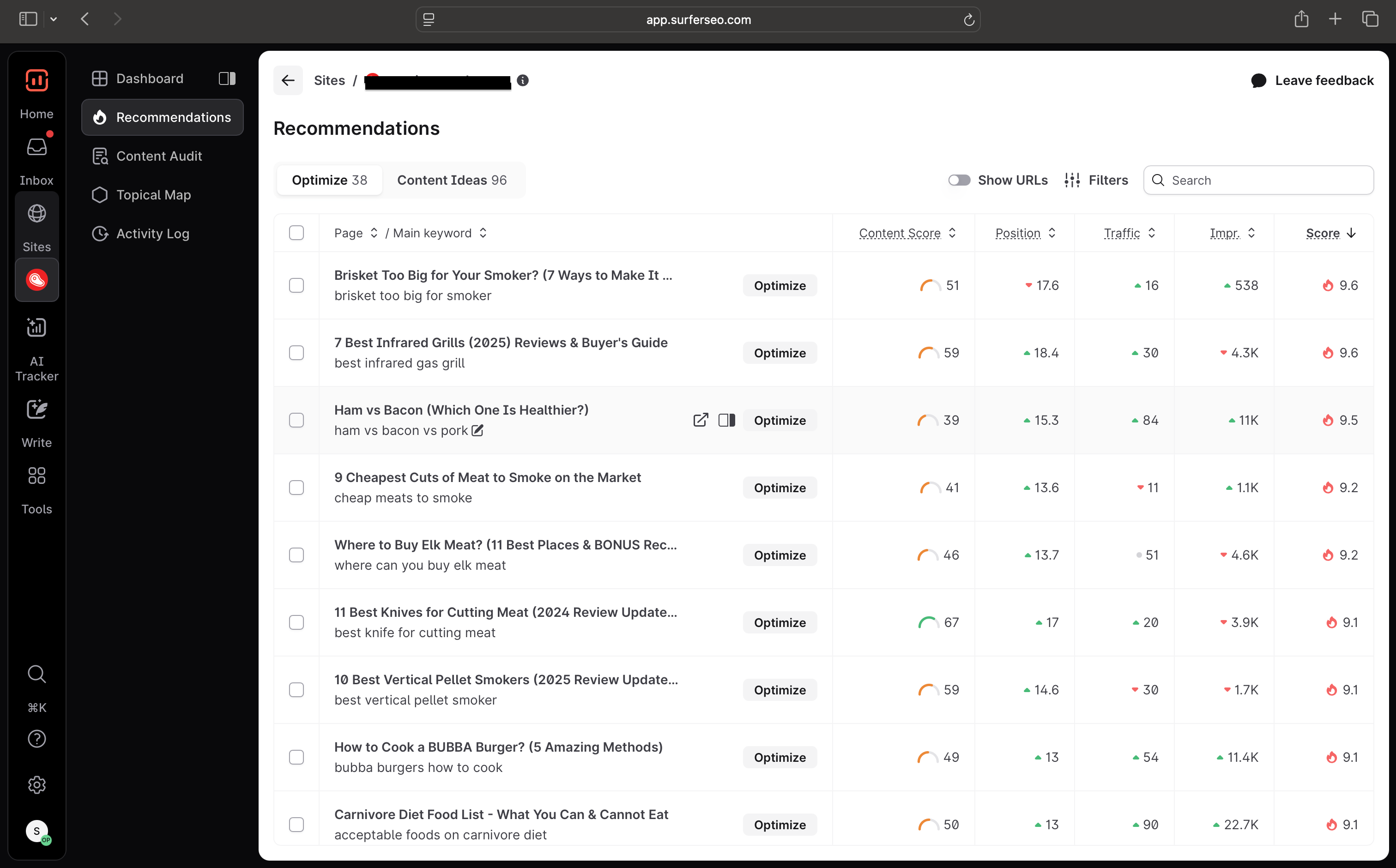
You want to ensure that your website covers relevant topics since AI tools rely heavily on a website's credibility in a niche. Surfer's Topical Map does a great job of showing you which areas you already have authority in.
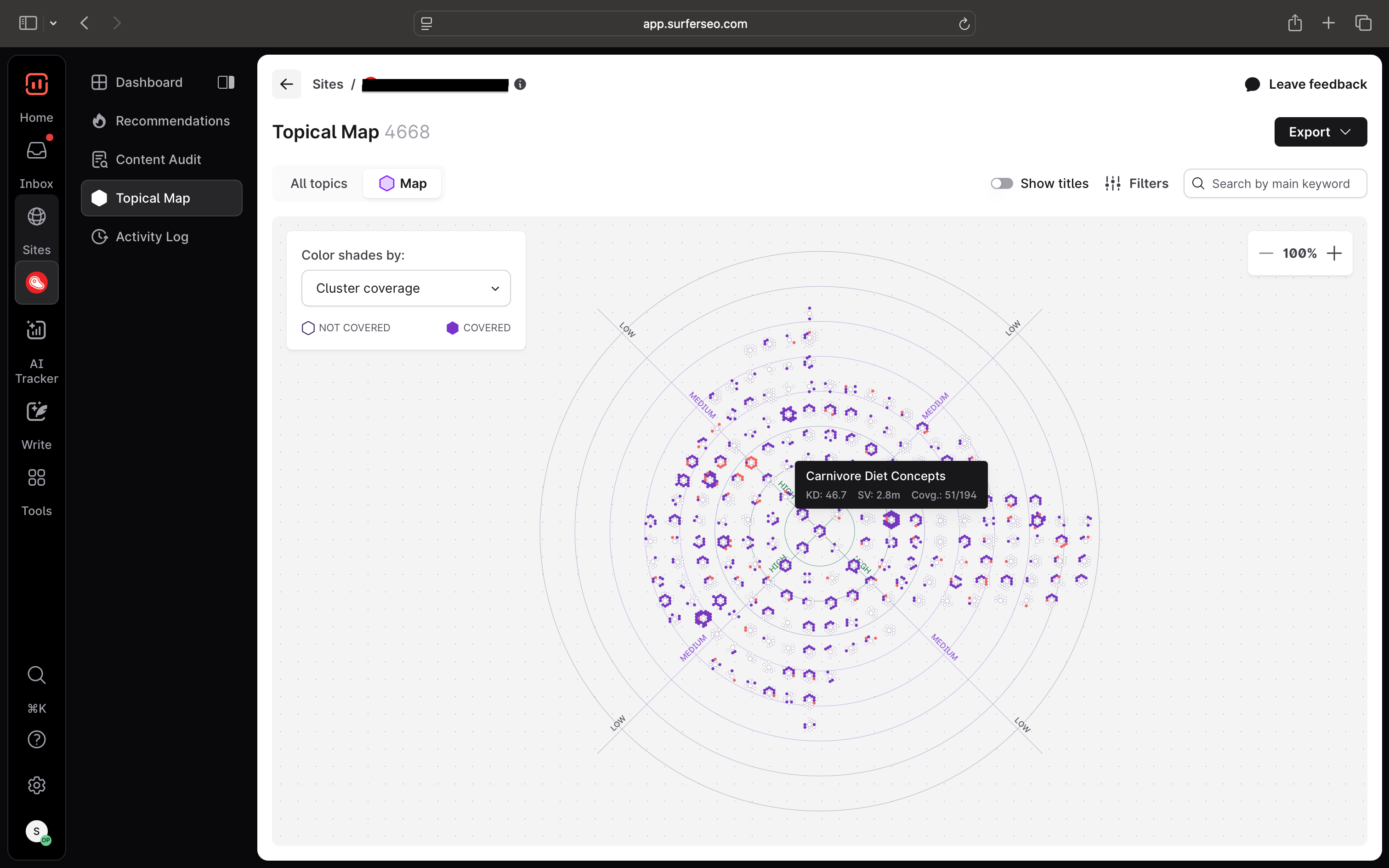
This way, covering related topics will improve your chances of showing up in traditional as well as AI generated answers.
You can select keywords based on their difficulty and search volume. For example, here's a snippet of topics that the website below can rank for.
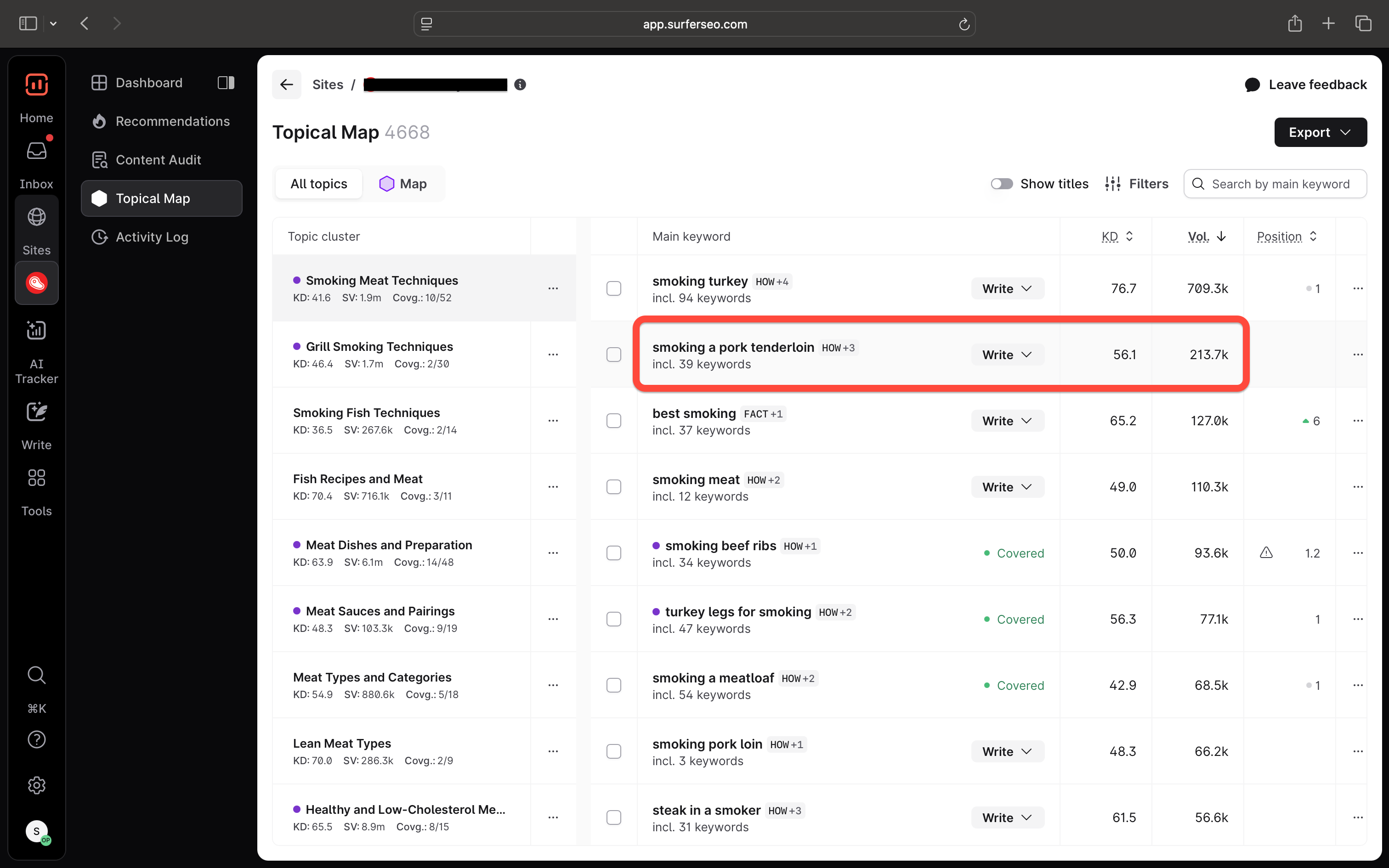
Surfer's AI Tracker also helps you track your visibility in AI generated results in 3 ways.
- The Mention rate shows you how frequently your brand is mentioned
- The Average position reveals your average
- The Visibility score is an overall metric showing your brand's appearance and ranking in AI generated results.
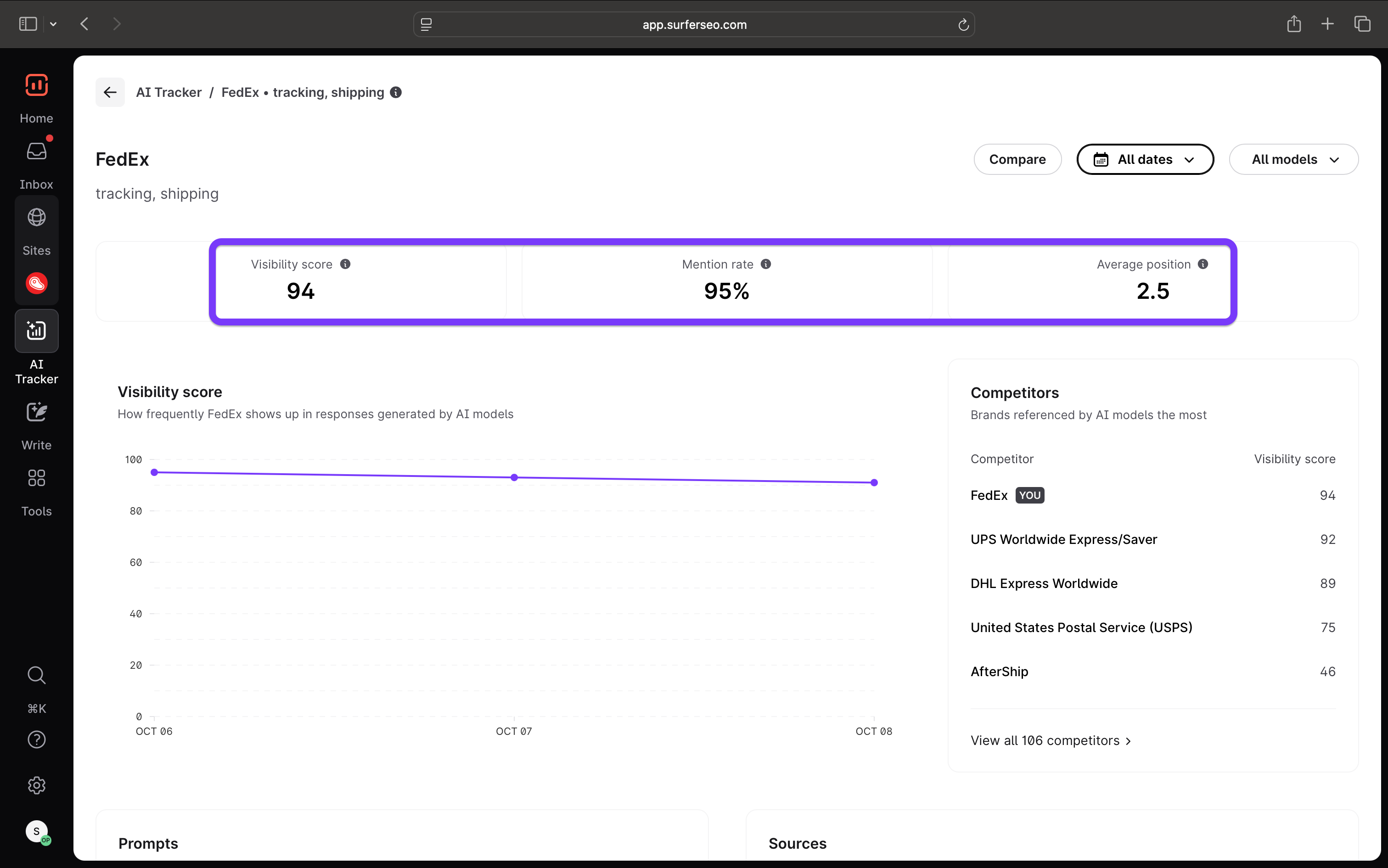
You can also track competitors and other sources that show up alongside your pages. And to see how your brand appears on the top LLM platforms including ChatGPT, Perplexity and Google's AI answers.
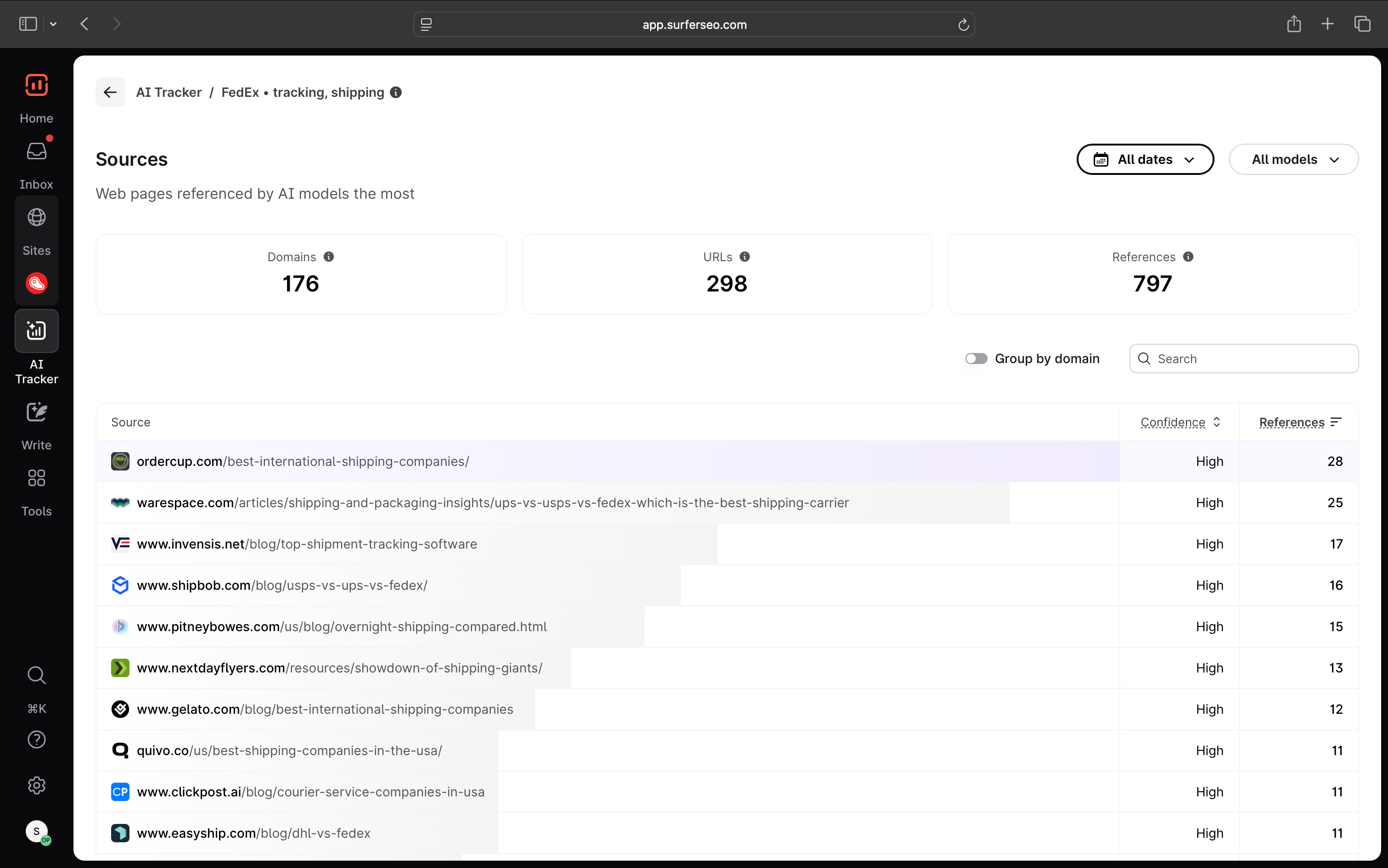
I'm most excited by the ability to track prompts that users are typing into platforms like ChatGPT.
You can add prompts that you'd like to show up for and track your AI visibility for these keywords.
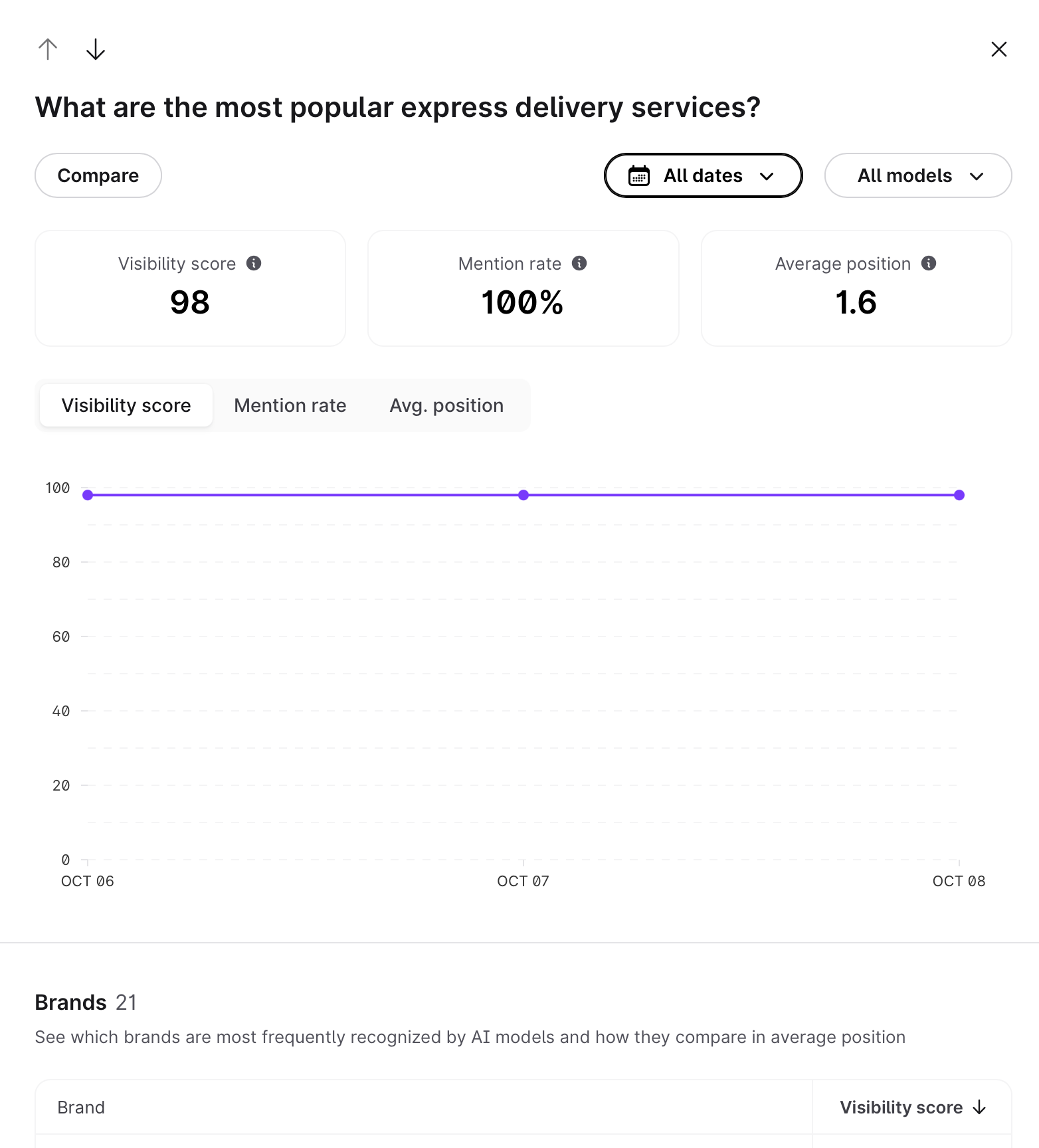
Surfer's optimization score metric helps guide you through the use of entities and information to improve your chances of appearing in AI answers.
I like the fact that you don't have to buy a separate tool for other SEO tasks since Surfer handles everything in one platform.
2. Semrush
Semrush has long been among the favorites for marketers looking for a platform that handles everything related to search engine optimization, from keyword research to technical audits.
Among the core AI features is Semrush Copilot, the platform’s built-in assistant that makes common SEO tasks easier to handle. For example, it can point out technical issues, flag toxic backlinks, highlight traffic drops, spot keyword gaps, and more.
Plus, if you're not sure why exactly an issue is a problem, Copilot also provides an explanation of how it impacts your site.
Once Copilot flags an issue, you can jump straight to the linked feature to address it and set things right.
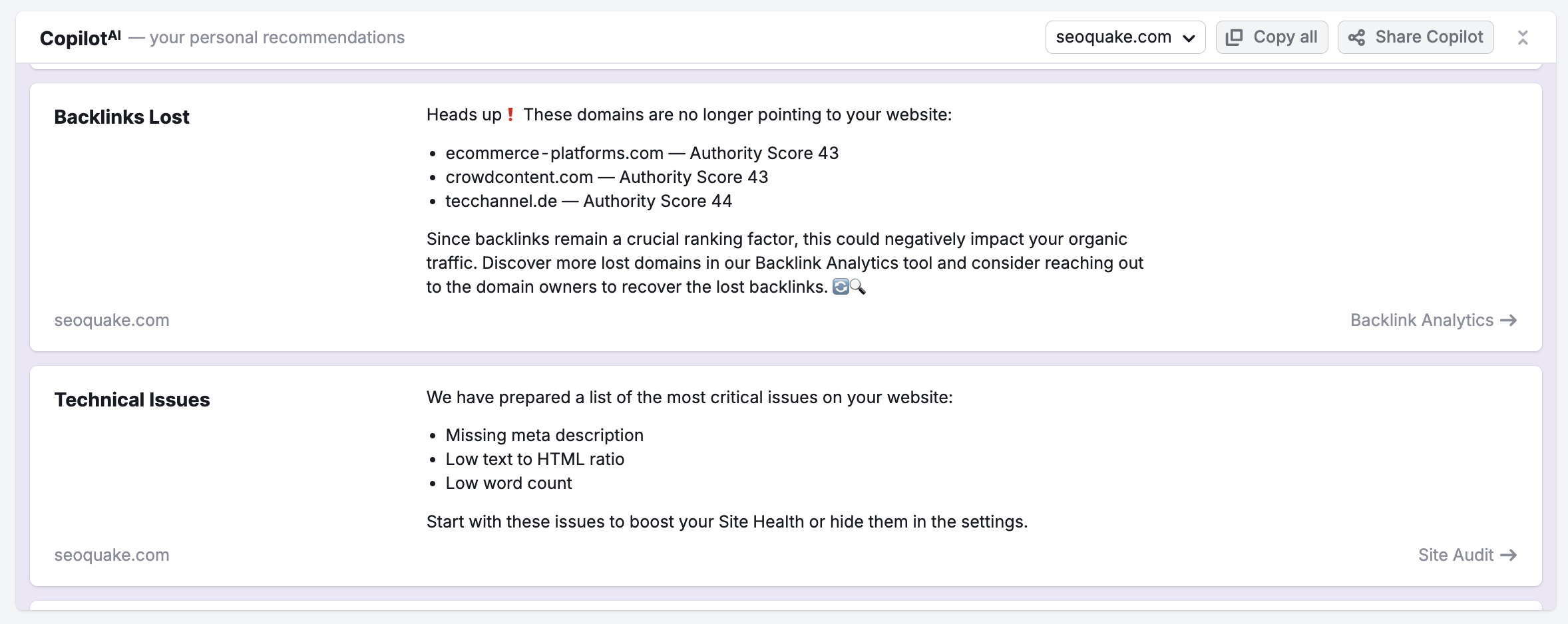
Semrush also offers the Visibility Overview tool, which shows how your site performs on ChatGPT and AI Overviews. It gives you a breakdown of your overall AI visibility score, how often your brand is mentioned, and the number of times it’s cited as a source.
You can also see the exact prompts you’re ranking for, view the LLM’s generated response, and filter results for both AIOs and ChatGPT. To add custom prompts for Semrush to track, navigate to the Prompt Tracking tab.
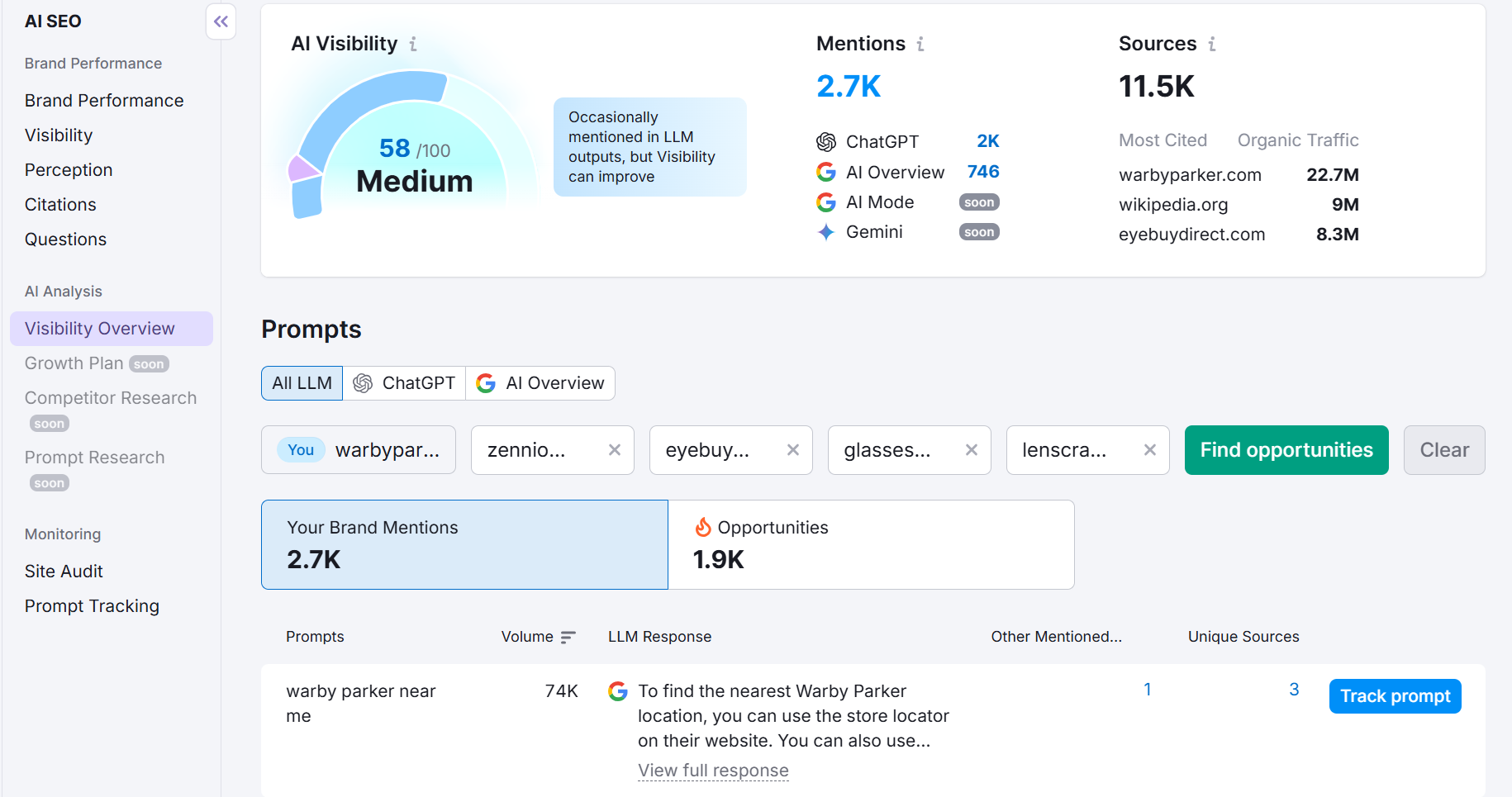
3. Ahrefs
Ahrefs has long been among the first tools marketers think of when discussing SEO software, so it’s no surprise they were also quick to bring AI into the mix. You can use AI on the platform for keyword research, content creation, brand tracking, technical SEO, and localization.
With keyword research, you can describe your website's niche and the audience you're targeting. Ahrefs' AI will then generate a list of keyword ideas along with their associated metrics. When running a SERP analysis, you also get deeper insights into search intent and what readers are looking for in a page.
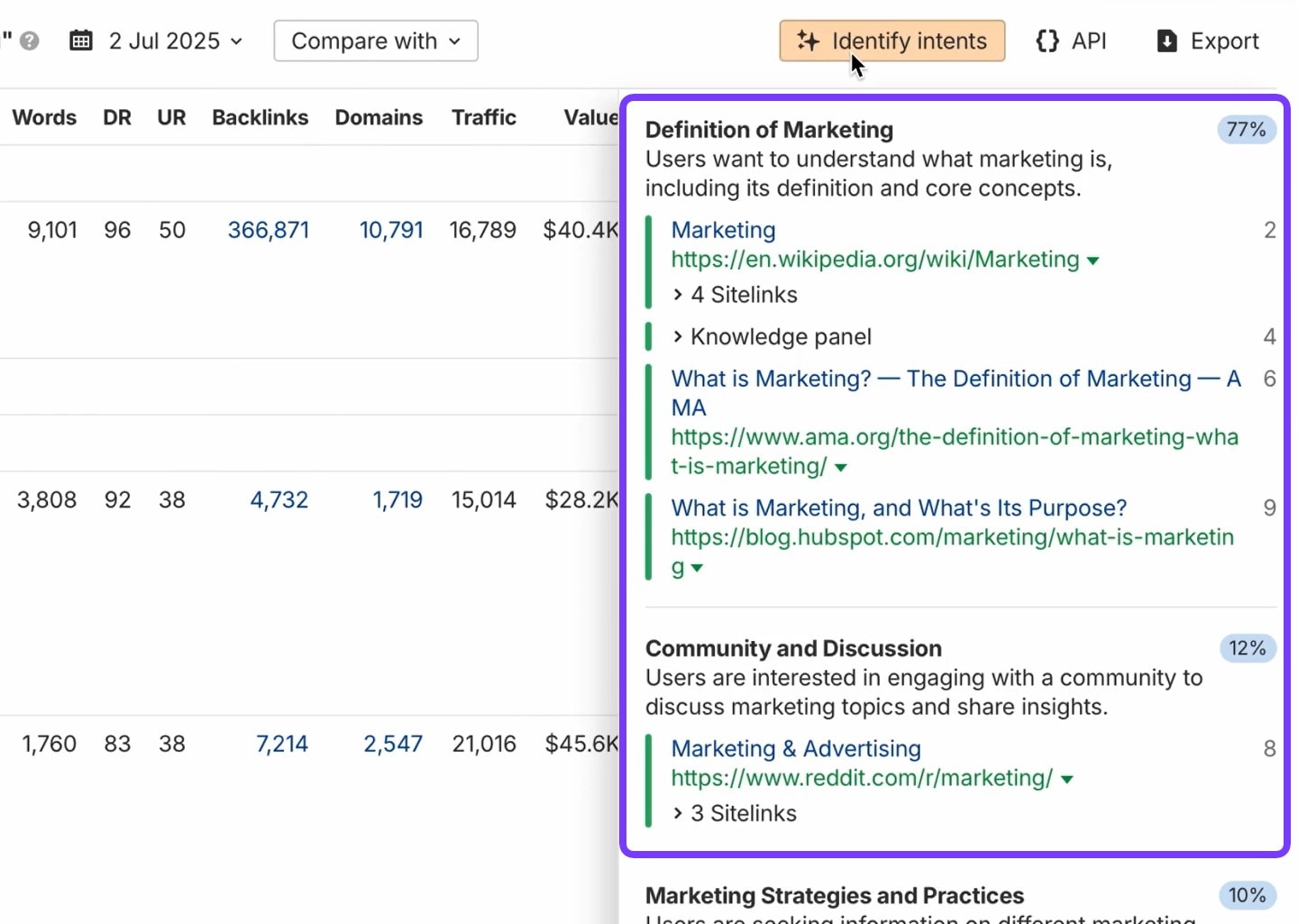
Plus, if you're targeting a global audience, Ahrefs can provide keyword alternatives in over 40+ languages and dialects, along with their SEO metrics.
Ahrefs’ AI also flags and helps fix poor SEO practices on your site. For instance, if your meta descriptions or titles are too long, it will identify them and suggest alternatives.
It also handles technical issues like broken links, giving you the option to automatically redirect them to a URL of your choice.
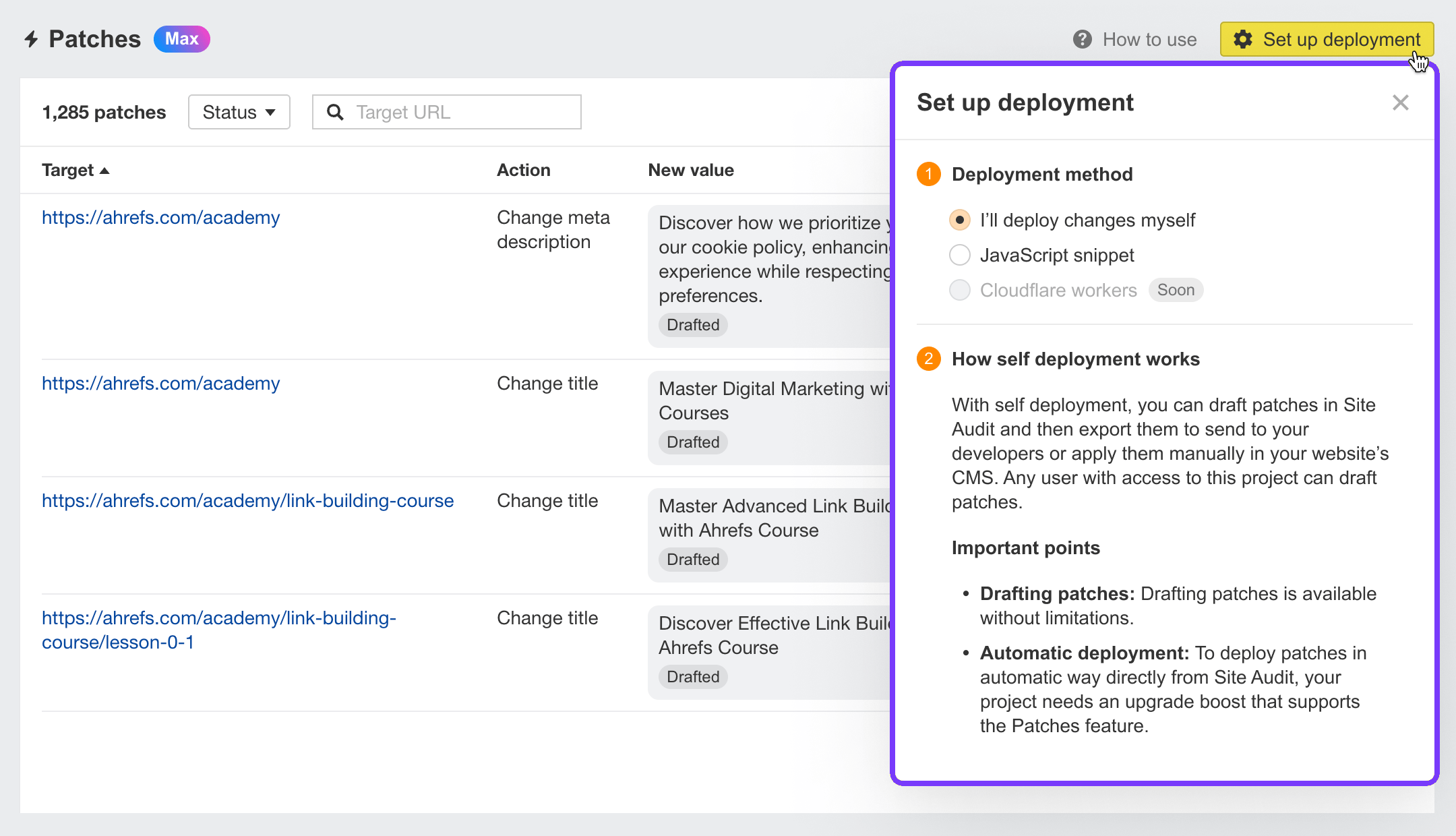
You also get access to other AI tools for SEO with Ahrefs, including Brand Radar, which tracks your site performance on Google's AI Overviews and various LLMs like ChatGPT and Perplexity.
4. SE Ranking
SE Ranking offers traditional SEO tools like keyword research, rank tracking, and backlink profile tracking, but has also integrated a lot of AI features into its platform.
Among these is the Google AI Overview tracker, which shows whether your website is ranking in AIOs, along with metrics such as your overall AIO presence percentage, the share of mentions or links in AIOs, how often you're cited in the top three, and for exactly which keywords.
You also get a neat graph where you can filter for this information over a specific period, plus the ability to sort by:
- AI Overview Presence: The total number of keywords that trigger AIOs
- Organic–AI Overlap: The share of top-20 organic pages that also appear in AI Overviews
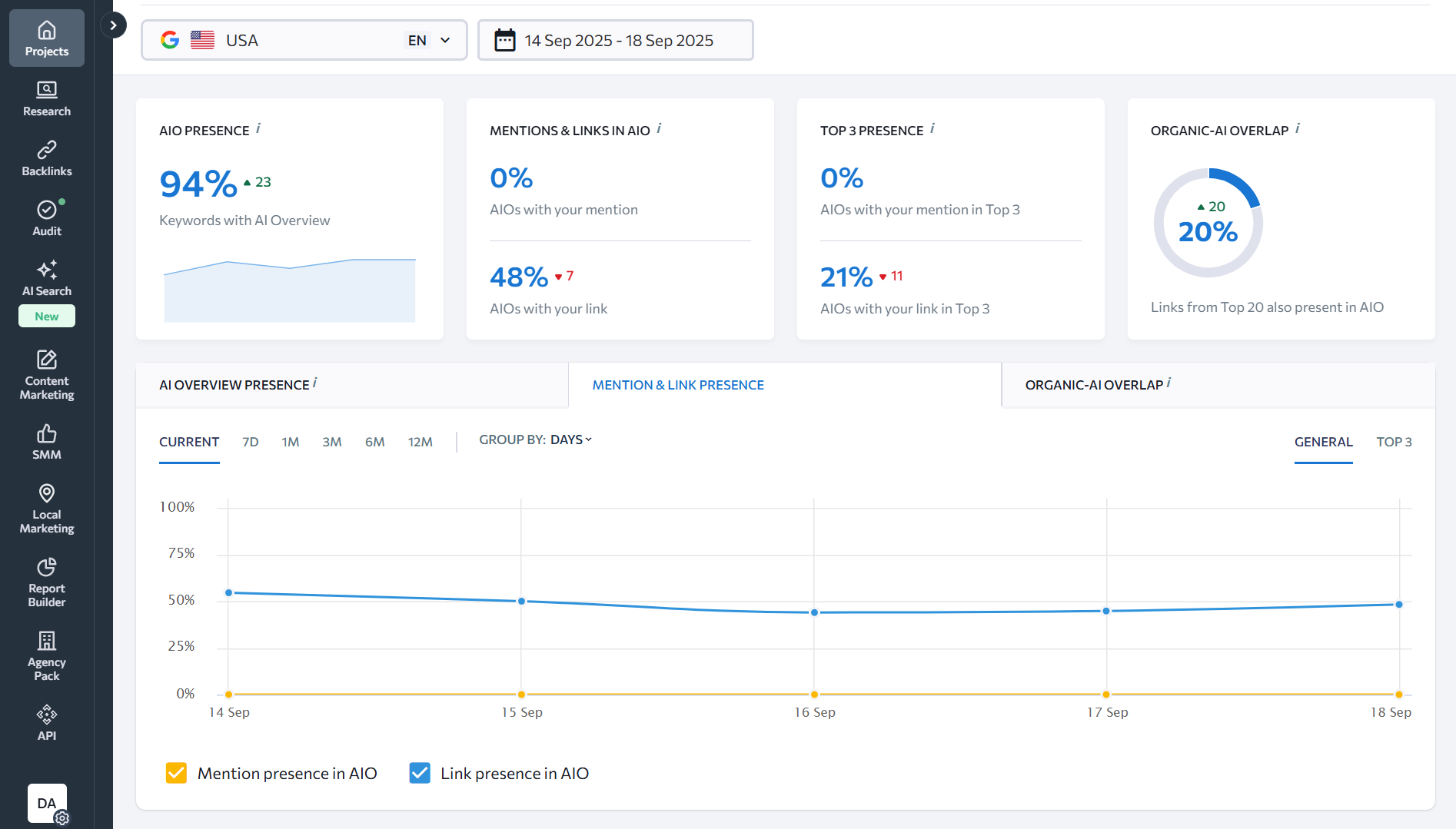
SE Ranking also offers an AI Results Tracker, which monitors your performance across ChatGPT, Gemini, and Perplexity. To use it, you manually add the prompts you want to track, and SE Ranking periodically checks how well you’re showing up in AI search results.
The catch, however, is that its scope is limited to the number of prompts you enter.
5. Frase
Frase is primarily a content optimization tool that also offers loads of other convenient AI SEO features.
Among these is the AI Writer, which analyzes SERP results for a given keyword to show how competitors structure their content. It then generates an outline for your article using those collected insights.
You can then generate a full article with Frase’s AI features. It pulls from its SERP analysis and outline to create a draft that you can refine. You can also set content guidelines (like brand voice, tone, and style) to shape how the AI-generated content comes out.
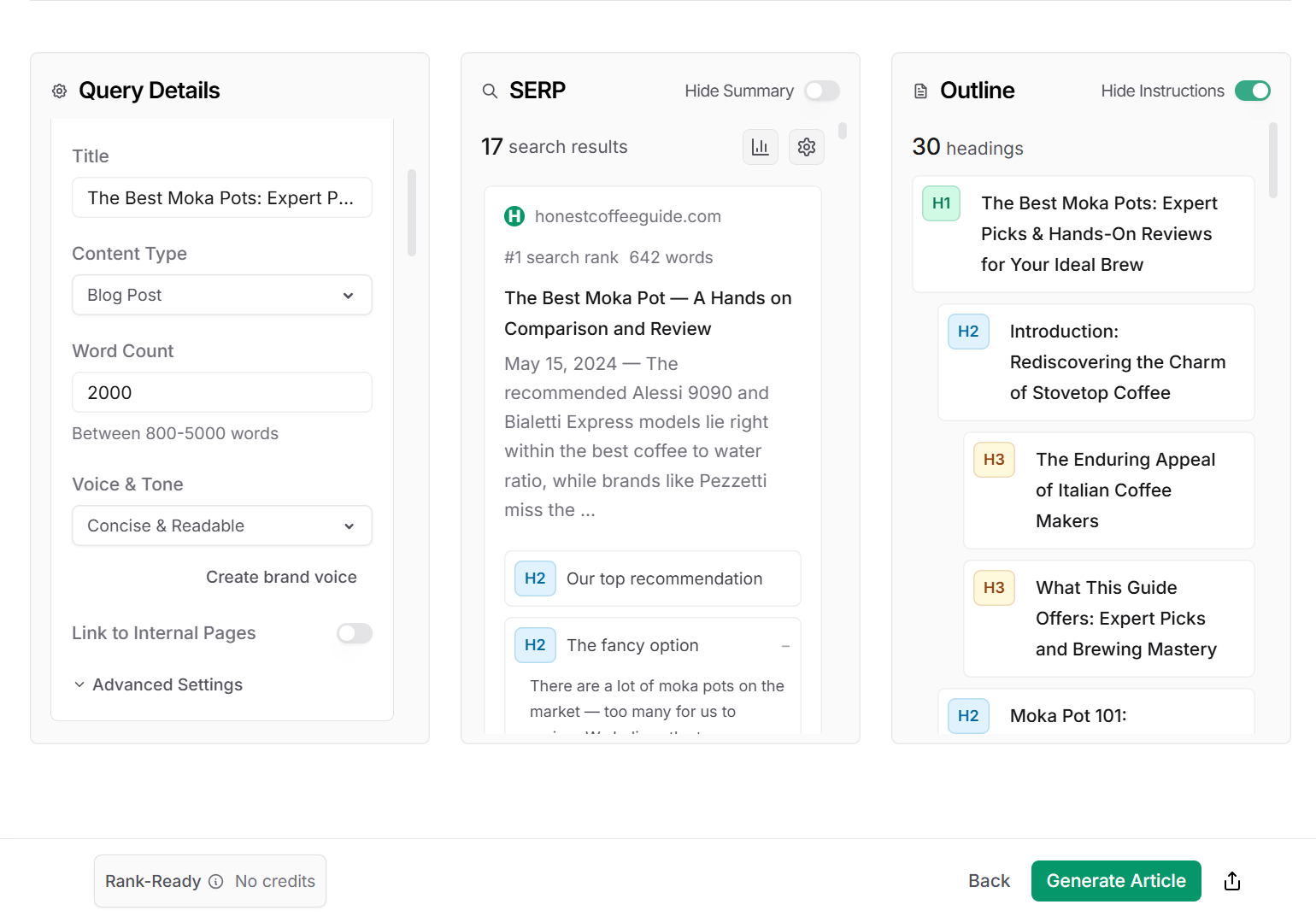
You can then optimize content by weaving in the suggested keywords. The more keywords you add to your article, the higher your Frase score will be.
Frase also offers a GEO optimization tool, though it’s still in beta. And with the field being as new as it is, the tool may not be the most reliable, so it’s best to treat the suggestions as what they are and not gospel.
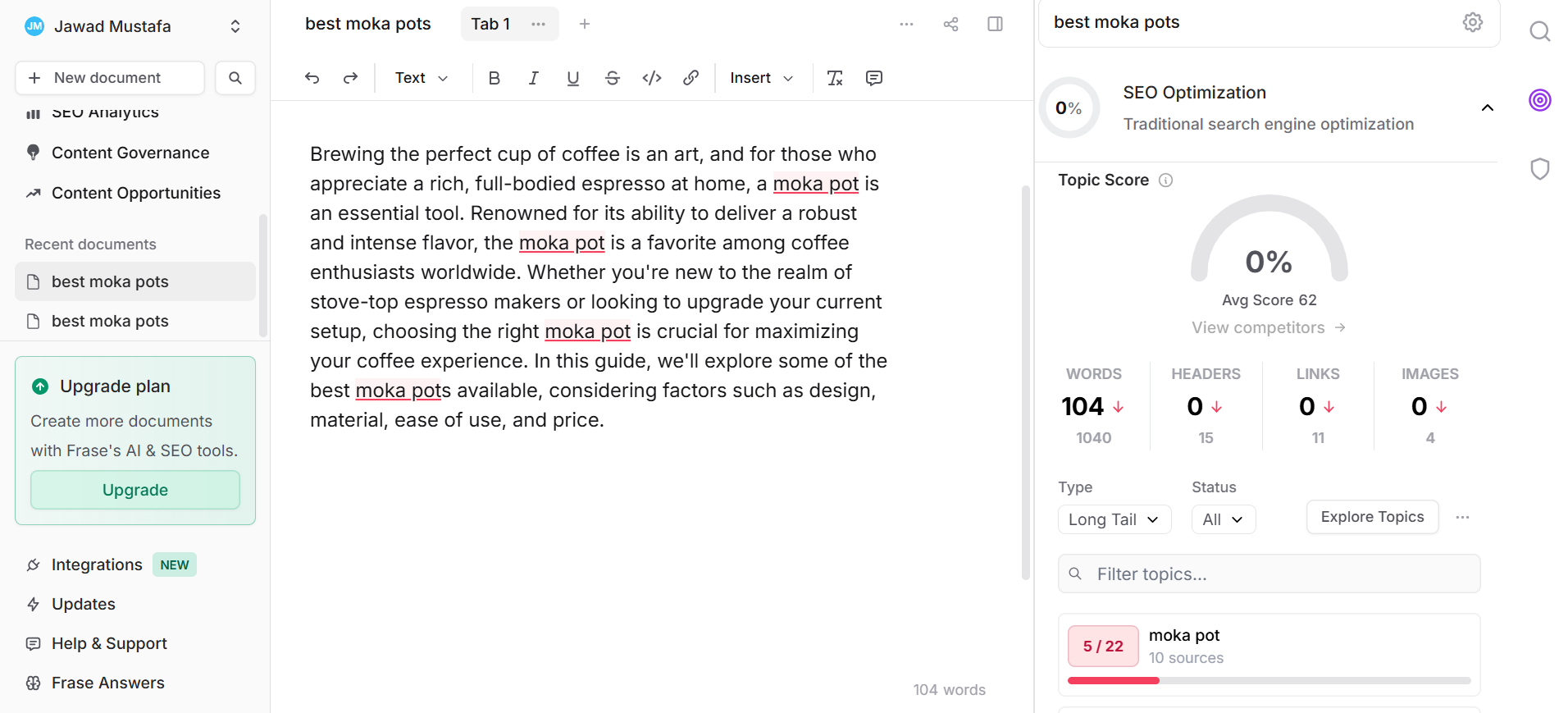
Frase also offers a few other notable AI SEO tools, including meta title and meta description generators. It offers other general SEO features too, like the ability to track site performance and find new content opportunities by connecting the tool to Google Search Console.
6. MarketMuse
MarketMuse uses AI to help you create SEO optimized blog posts, plus it also has various other tools to help you rank higher on search.
The tool runs a SERP analysis and helps gauge what your competitors are doing right. This includes MarketMuse’s AI score to show how optimized the content is, along with other useful details like the number of headings, images, and internal or external links.

The tool also helps highlight important terms and keywords for your content, along with how often to use them. You can also see the exact ranking pages MarketMuse took this information from, and a score of how it ranks them.
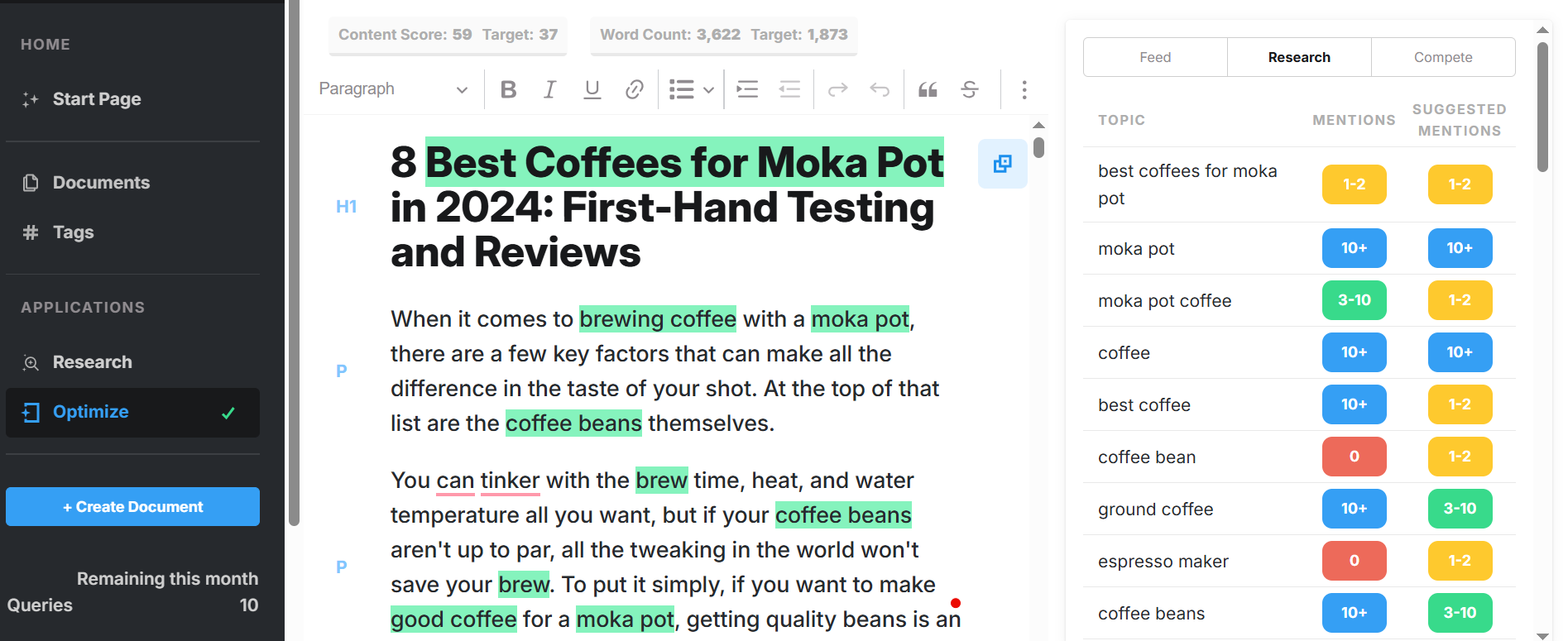
Besides these, MarketMuse offers other general SEO features that don’t necessarily tie into its core AI suite, including keyword research and keyword clustering tools.
7. Alli AI
Alli AI is another in the list of AI-powered SEO tools. It helps users identify and fix technical SEO issues directly through the platform.
It scans your site for on-page issues like missing H1 tags, untitled links, missing meta descriptions, and more. You can apply the fixes with a single click. Plus, if you want to make changes directly through your website, you can use the Live Editor, which lets you edit titles, descriptions, or anything else without touching the backend.
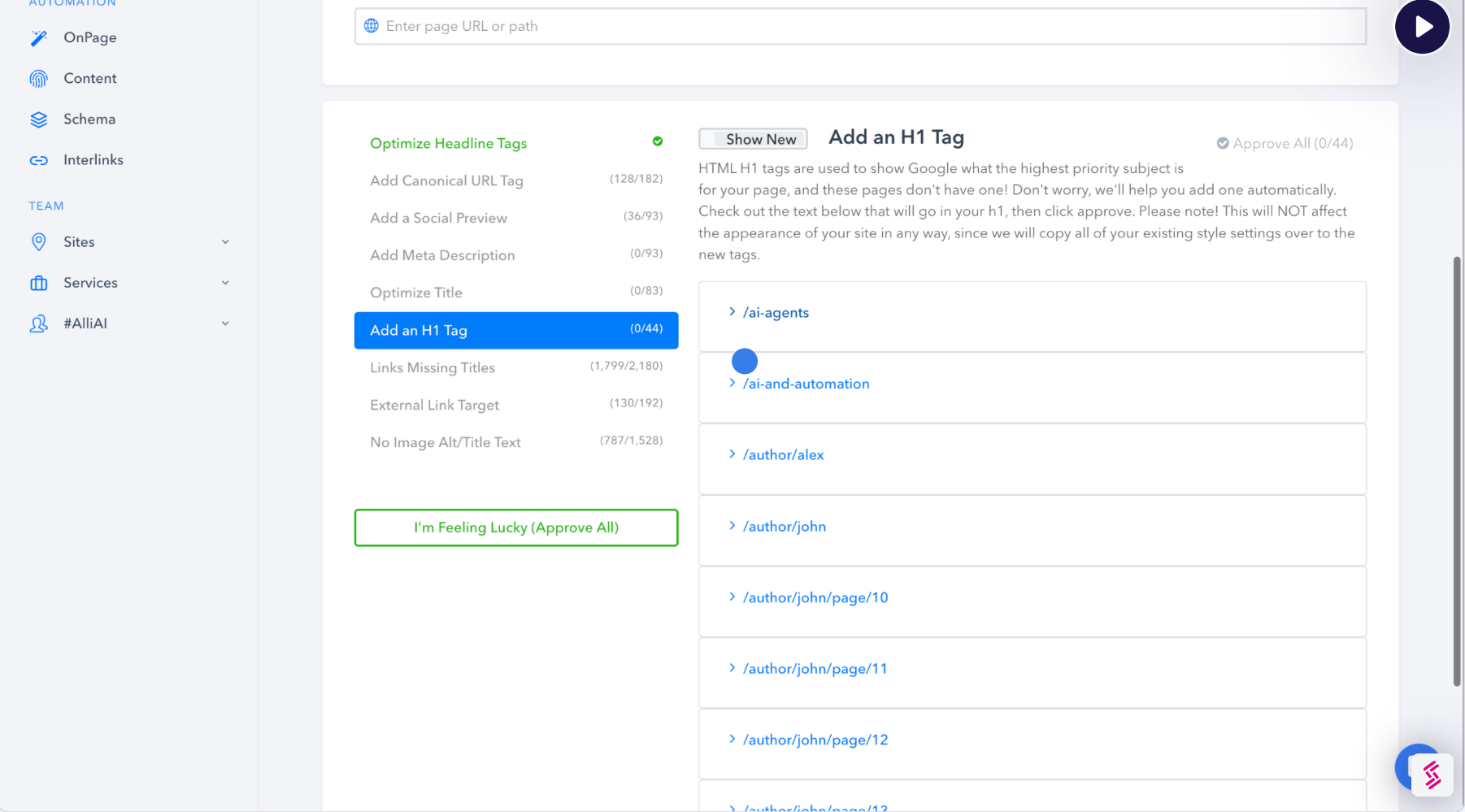
AlliAi also offers an AI search visibility engine that makes your site easier for LLMs to access and crawl. If your site doesn’t work without JavaScript, or if security systems like Cloudflare are blocking AI crawlers, you could be missing out on citations in AI chatbots. This tool helps you resolve those issues.
Other AI features on the platform include a Schema Generator and an internal linking automation tool. With the schema markup feature, Alli AI scouts your website to generate a relevant schema markup, which helps search engines better understand the content of your site. If you already have existing markup, the tool suggests improvements.
The internal linking tool is similar; it finds missed internal linking opportunities on your site and recommends additions.
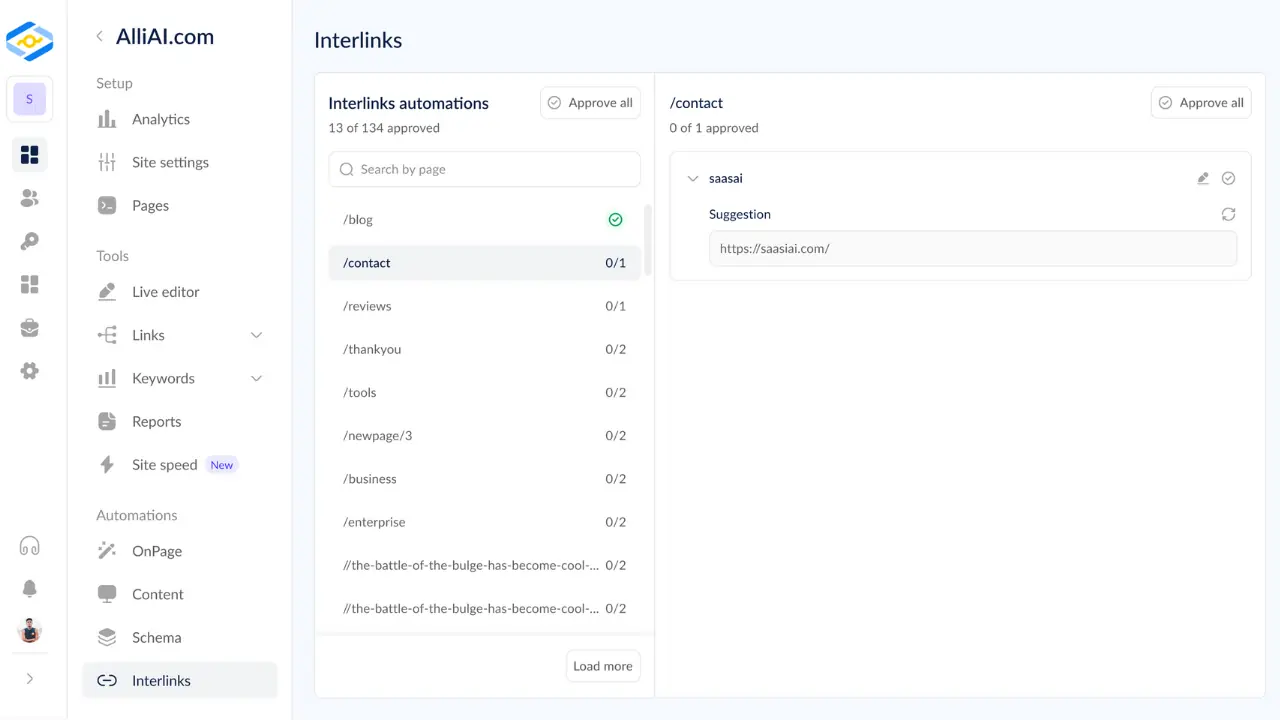
8. Rankability
Rankability uses AI to help you create content with a strong chance of topping search engine rankings. Its features include tools for optimizing existing content, generating detailed content briefs, and even drafting full articles with the platform’s AI.
Starting off, it conducts a competitor analysis to identify the search intent, target keywords, and get an idea of what's ranking. You can access more details on these from the Competitors tab, including their ranking positions and Rankability scores.
It then uses this information to generate a content brief.
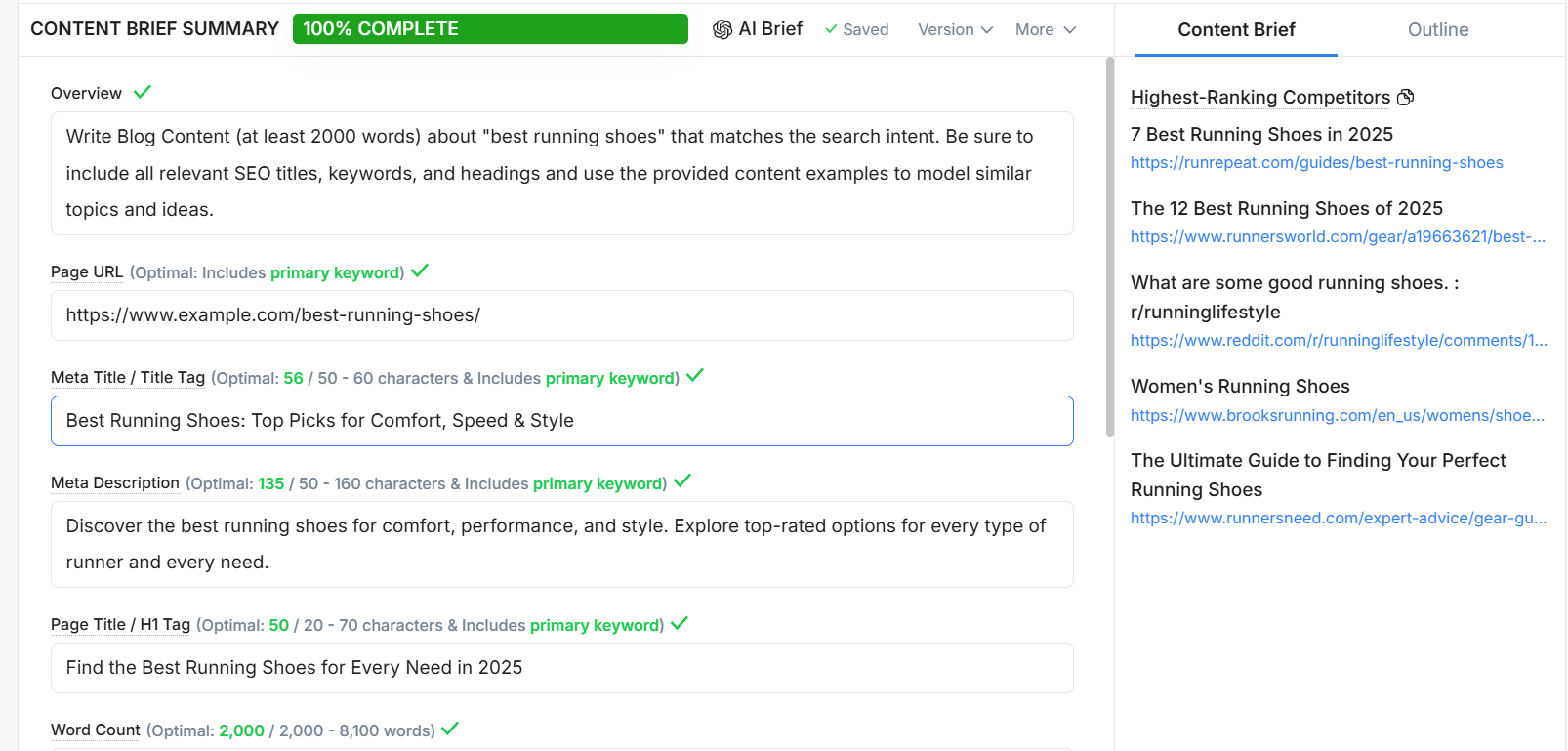
You can have the AI draft the SEO optimized content for you, or you can do it manually. The content optimizer provides suggestions on which keywords to include and gives you a Rankability Score.
The more terms you add to your article, the higher the score. You also get details on your content’s total word count and its readability level.
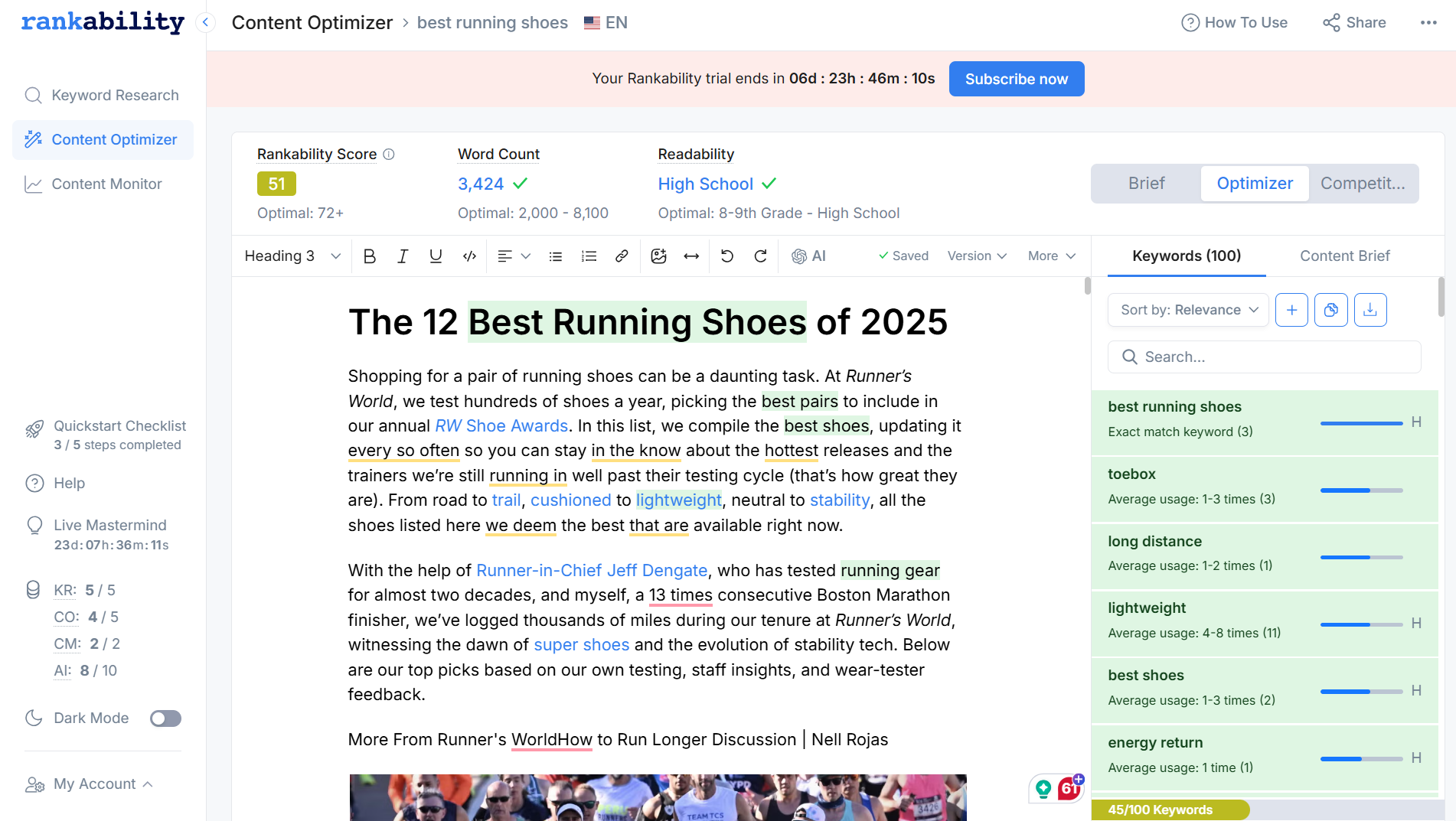
Rankability also includes a keyword research feature that lets you find terms related to your primary keyword, along with metrics like search volume, CPC, and keyword difficulty. You can also use it to monitor existing pages on your site. Just enter the primary keyword and page URL, and Rankability will show your current score as well as the recommended score.

9. Writesonic
Writesonic is an enterprise grade generative engine optimization platform that helps track, benchmark, and optimize your brand’s visibility in AI search results.
The tool measures how often AI models like ChatGPT, Gemini, Claude, Perplexity, and Google’s AI Overviews mention and cite your brand when generating answers. It reveals which prompts you win, where competitors dominate, and which URLs AI engines pull from when answering user queries.

Writesonic doesn't stop at monitoring, it analyzes the sources the models pull from, detects when AI bots crawl your site (or fail to), and surfaces structural issues that make your content hard for LLMs to interpret.
The Action Center turns those insights into concrete fixes, from content gaps and page updates to crawl accessibility issues and third-party outreach workflows, so teams can improve how models interpret and cite them—without leaving the platform.
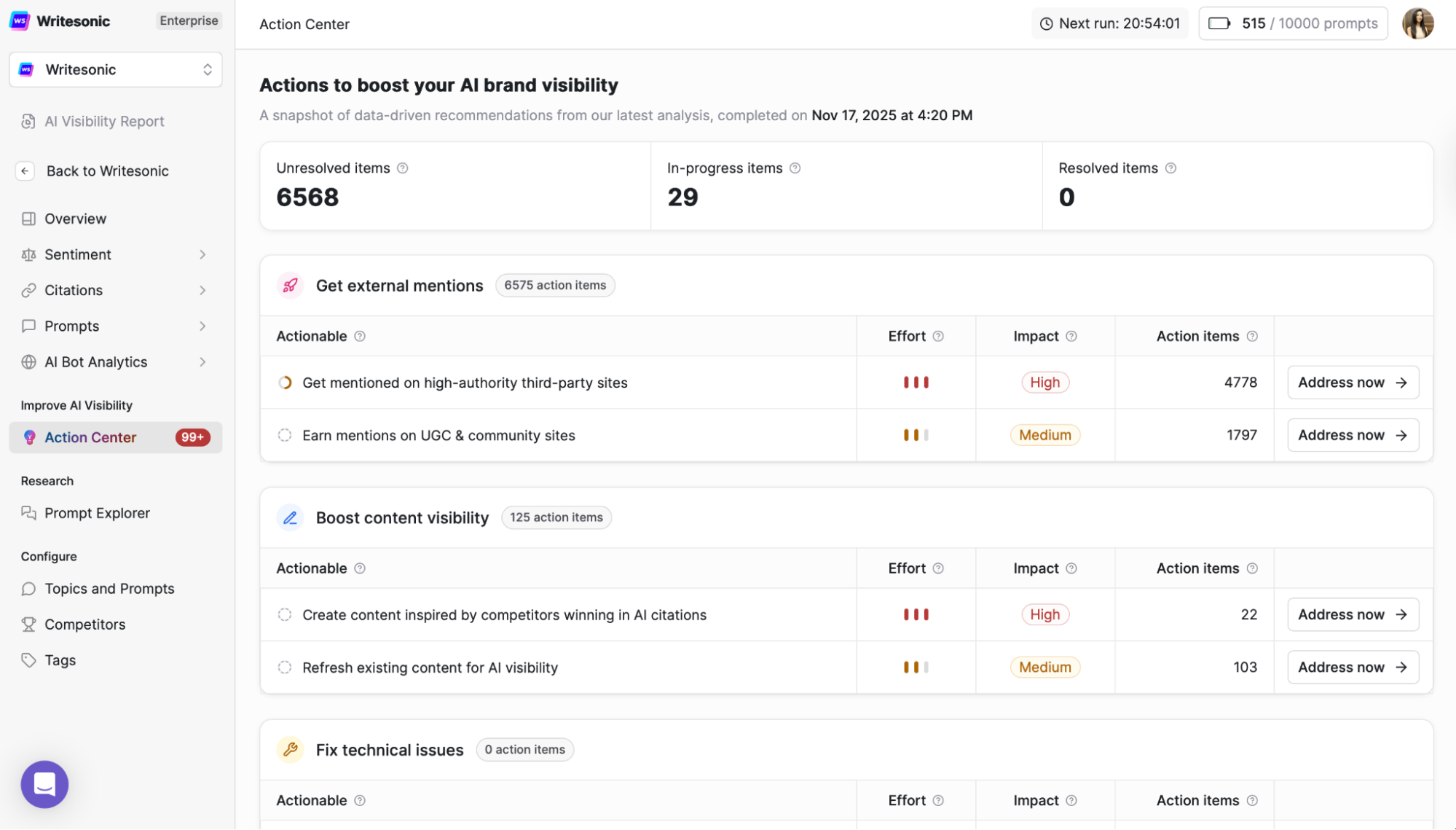
If you need a platform built specifically for the new world of AI-driven visibility, Writesonic is a comprehensive and actionable solution.
10. DashThis
DashThis is primarily a marketing reporting tool for marketers and agencies that now layers AI on top of your dashboards so you don’t have to comb through every data source. You can connect your marketing channels once, and DashThis will analyze and show you performance changes, and new opportunities to act on.
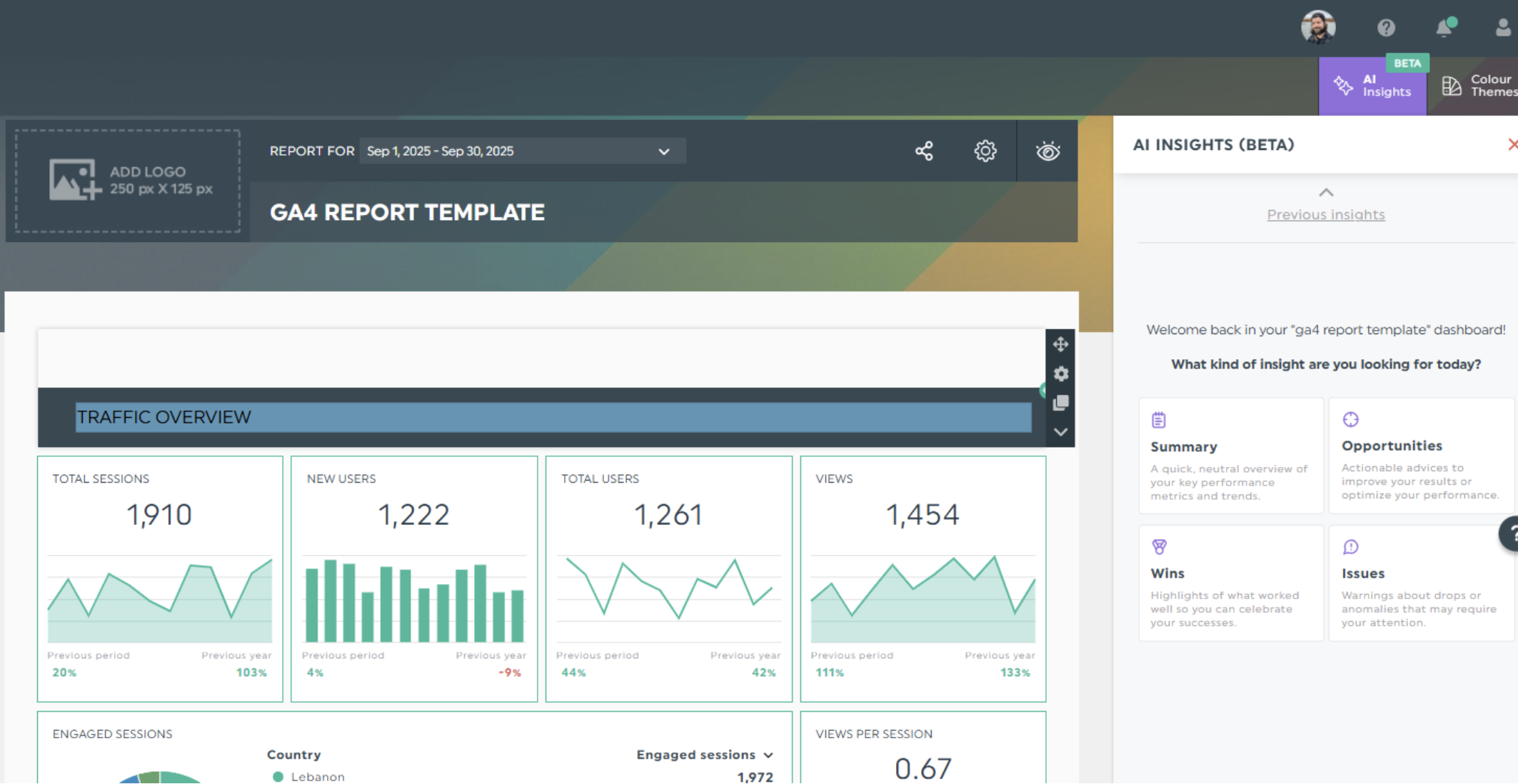
Among these is their AI Insight feature, which reads the data coming from your connected platforms and highlights trends to watch, traffic and cost anomalies, underperforming segments, and quick wins.
Instead of hopping across widgets, you get a short, plain-English brief and links to the exact dashboard tiles to investigate.
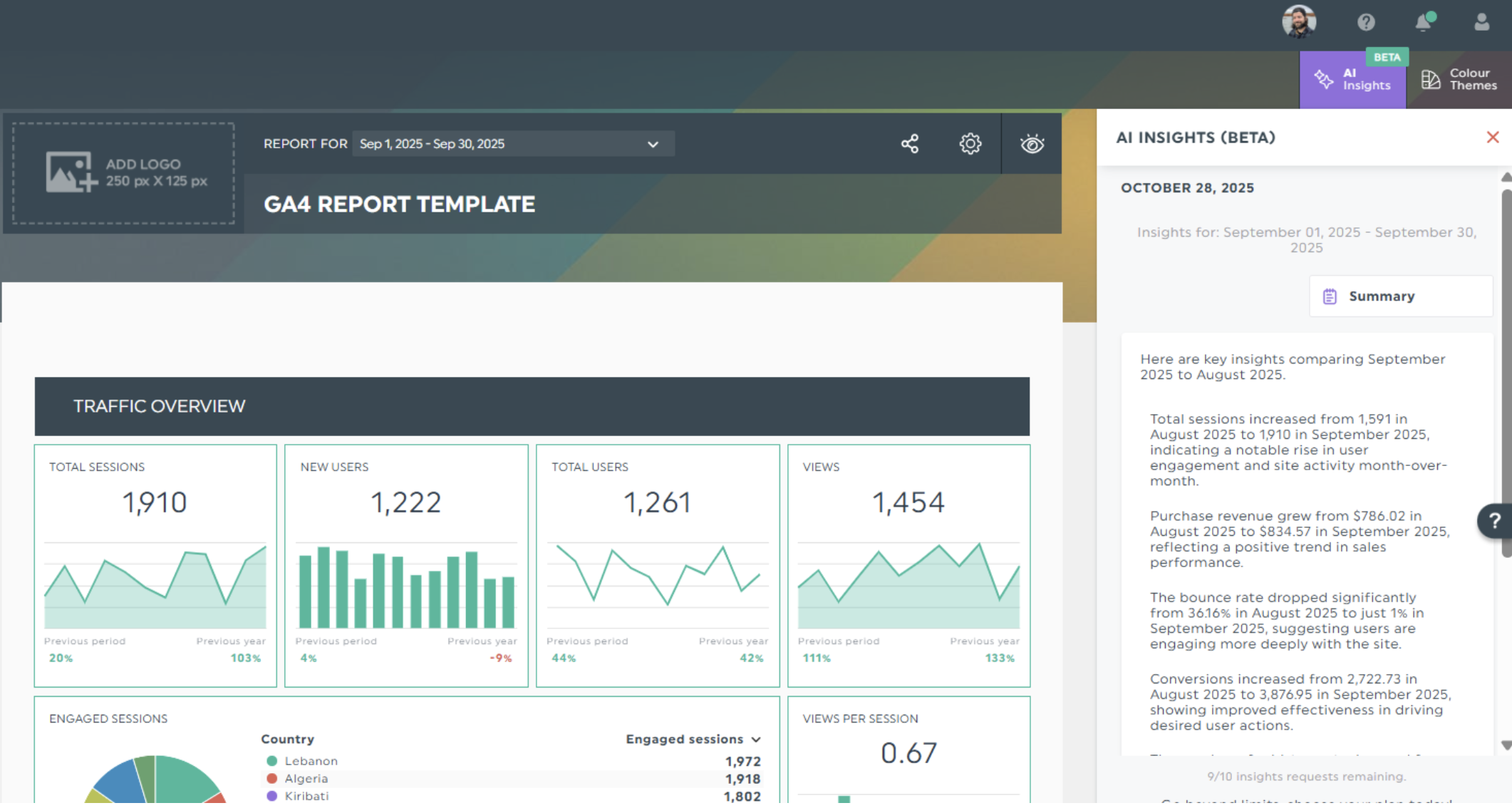
You can build a single dashboard that combines data from several tools including GA4, Google Ads, Search Console, Meta, LinkedIn, YouTube, HubSpot, Ahrefs, TikTok, Klaviyo, Google Business Profile.
The tool can also analyze custom data sources alongside 30+ integrations with other tools.
DashThis’ AI interprets performance through four lenses:
- Insights: a quick, intelligent overview of what changed and what stayed stable across channels.
- Opportunities: actionable ideas to improve campaigns (budget shifts, keyword/ad set focus, audience tweaks).
- Wins: auto-detects top performers so you can double down or replicate success elsewhere.
- Issues: early warnings for anomalies and underperforming areas, plus suggestions to fix them.
I like that the data reports update automatically –set your date range, schedule email/PDF sends, or share a live link, and the AI notes refresh with new data.
11. ChatGPT
Although not a traditional SEO tool, ChatGPT can still be a great resource in your SEO efforts. Among its most basic uses is to have the tool generate content ideas.
If you only have a rough idea of the content strategy you want to use, ChatGPT can help smooth out the edges and provide actionable insights on how to move forward. For example, here I asked the AI for advice on a hypothetical content strategy for a footwear affiliate site.
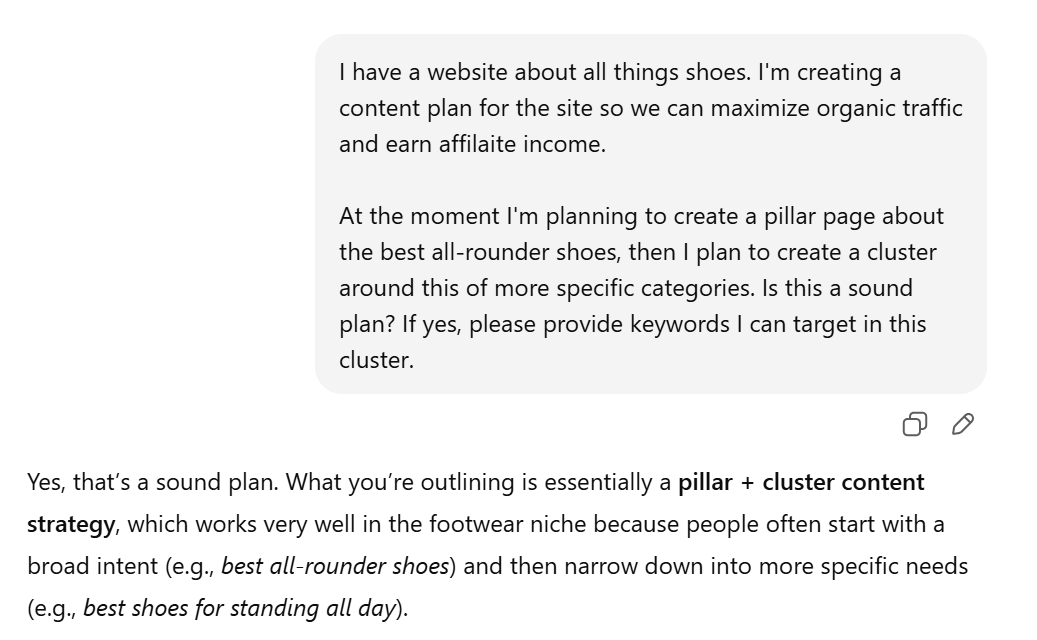
It generated a list of related cluster keywords I could build around the main pillar page I suggested. But keep in mind, ChatGPT isn’t an SEO tool, so it won’t give you metrics like search volume or keyword difficulty. I’d recommend pairing it with a dedicated keyword research tools to validate its suggestions and confirm whether they’re worth going after.
The next best thing ChatGPT does is write content. Prompt the tool with detailed guidelines on the tone/style to use, who your audience is, the search intent behind the keyword, how the article should be structured, and any other relevant information. ChatGPT has a dedicated canvas mode for this use case, which makes editing a specific section easier.
But again, you miss out on the SEO side of things. Surfer helps solve this with an extension that integrates its features directly into ChatGPT, letting you incorporate relevant keywords and track your content’s SEO score.

12. Whatagraph
Whatagraph is an SEO and marketing reporting platform to help present complex performance data in simple to understand dashboards. It pulls performance metrics automatically from tools like Google Analytics, Search Console and third party tools, then blends and visualizes them so you can see organic traffic, keyword trends, backlink health, and other SEO KPIs in one place.
Althought strictly not an SEO tool, it also connects paid search and social analytics data, making it useful for teams tracking how traditional search and AI-driven visibility are performing together across platforms.
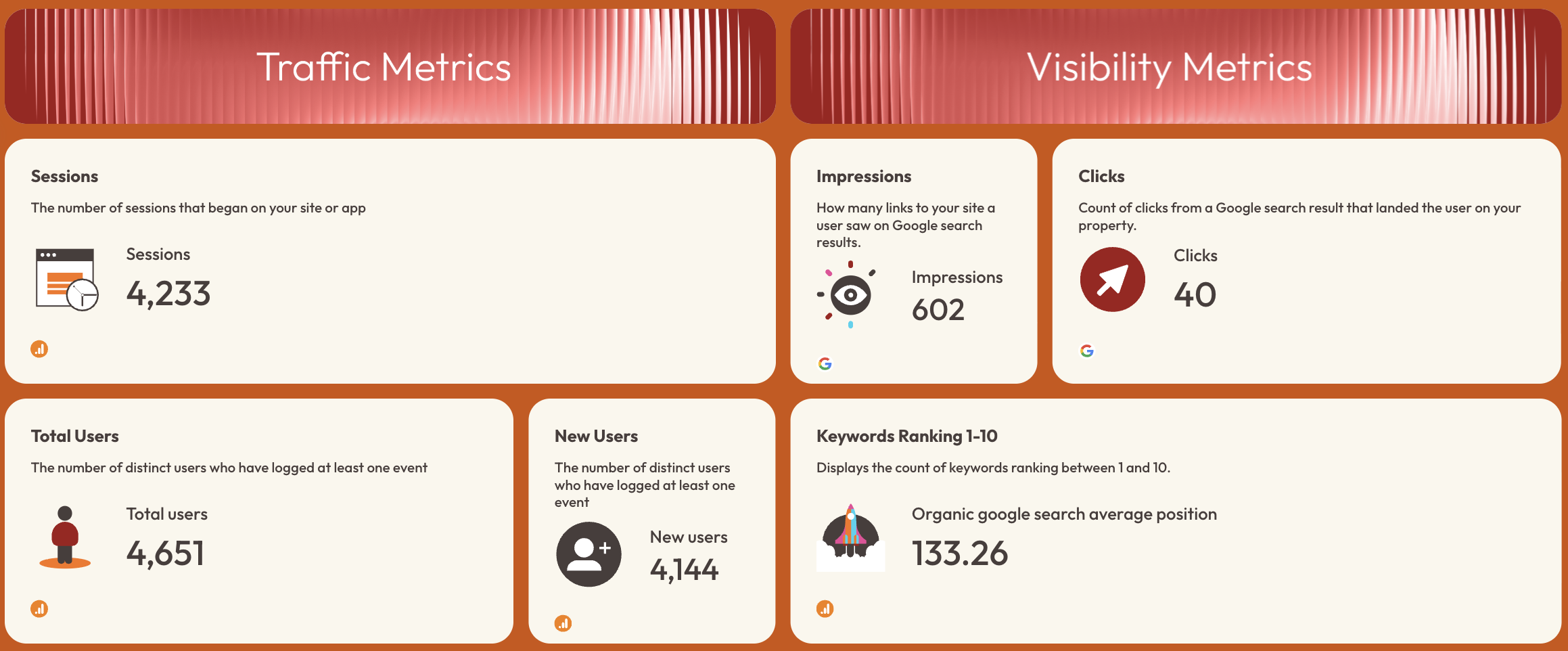
Unlike other tools on this list, Whatagraph doesn't help you create or optimize content for AI search. It's value lies in extracting insights across all your marketing analytics to inform future campaign activies. Since it helps you show how SEO and AI visibility translate into traffic, engagement, and conversions in a format stakeholders understand, it's suited for agencies and internal teams that need to present tangible results.
The platform also supports white-label reports, scheduled automated delivery, and real-time dashboards, making it practical for both internal teams and agencies.
Whatagraph’s AI-assisted insights generate performance summaries and answer questions about your data in seconds, so you spend less time interpreting charts and more on strategy.
Conclusion
Between Google's AI Overviews, ChatGPT citations, and all the other LLMs crawling the web, SEO has taken a major shift in the past year.
The good news? You don't need to panic. The tools I've covered here prove that SEO isn't dead, it's just changing. These platforms help optimize content for search, track AI visibility, or flag technical SEO issues that you might not have caught manually.
Pick a tool that handles both traditional search and AI optimization, because that's where we're headed. The sooner you adapt, the better positioned you'll be when AI search becomes even more dominant.




